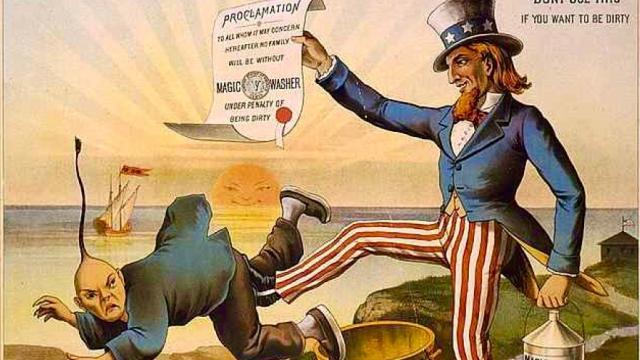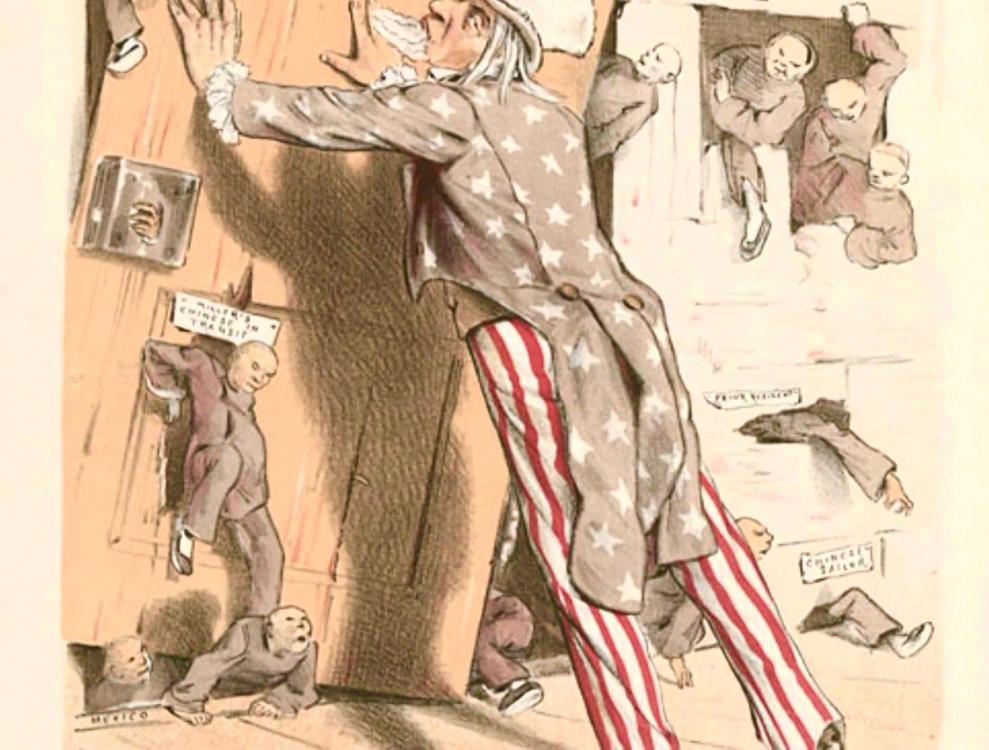
Tucked away in the final pages of the August 2016 edition of Time magazine is an interview with the photogenic actor Zachary Quinto. Quinto, who is openly gay, was featured in the Q&A section because he plays Spock in this summer’s blockbuster hit Star Trek Beyond. What struck me about the interview is how Quinto described his co-stars confronting an antagonist who wants to destroy the Federation, “a place that’s a hub for all different species and races.” The movie’s plot, according to Quinto, mirrors the “waves of nationalism and xenophobia and fear-based thinking and intolerance” that is “going on all over the world right now.”
While Quinto may like to believe the movie’s plot reveals something profoundly new about our contemporary selves, the fact is nationalism, xenophobia and intolerance reflect our country’s true foundation. The movie depicts the real American experience – a history fused with xenophobia, nationalism and, more accurately, racism. A convenient amnesia has swept across our country, particularly affecting more privileged Americans. It may be an inconvenient fact or an uncomfortable reality to admit that U.S. leaders have systematically spread hate and intolerance. Both phenomena are engrained in our history, rearing their ugly heads at moments captured within our nation’s press.
At the heart of nationalism is the belief that one’s country is superior to other countries. Nationalism breeds xenophobia. Since "their" country is the best, nationalists traditionally believe that they, the citizens of the “superior country,” are therefore superior themselves. All those who live outside the superior nation’s borders (especially those who look different and and have “funny” names), according to xenophobes, are to be feared and excluded. Xenophobia and racism, fundamentally, rest on the same logical base – a belief that a singular group holds inherently superior characteristics.
The Republican presidential candidate Donald Trump and his surrogates peddle xenophobia, nationalism and racism like candy. Trump previously called Mexican immigrants drug dealers and rapists. The Washington Post reported that Newt Gingrich, former Speaker of the House and a one-time VP potential for the Trump, called for the testing and deportation of Muslim Americans. Time reported in September 2015 that Trump’s former contender and now supporter Ben Carson even stated: “I would not advocate that we put a Muslim in charge of this nation.”
These Republican tactics are nothing new. Let me state an uncontested fact: This country’s founders were racist, xenophobes and mostly nationalists. All of them believed that White men were superior, and the United States was never to be inferior. None of them believed Black, Asian, Mexican or Native American or other non-Western European immigrants were equal to White men and women.
Thomas Jefferson, author of the Declaration of Independence, is often cited as one of the most liberal, enlightened founding leaders. He offers one of the most beautiful and poignant cries for freedom: “We hold these truths to be self-evident, that all men are created equal.” I wish we could go back in time to put an asterisk after “all men” because what Jefferson meant was “all White men are created equal.” At the time, the only true men were White men.
Scholars who study race, such as myself, turn to Ronald Takaki’s foundational book Iron Cages: Race and Culture in 19th-Century Americato understand how racist ideology informed our founding leaders’ thinking and actions. Jefferson, the great lover of freedom, sought not to create an egalitarian society; instead he wanted to create a “homogenous” republic. In 1814, Jefferson described how interracial breeding threatened the homogeneity of “lovely White” citizens: “Their amalgamation with the other colour …produces a degradation to which no lover of this country, no lover of excellence in the human character can innocently consent." Basically, he was saying a country full of mulattos would destroy the U.S.
Racism, xenophobia and nationalism inspired the U.S. Congress in May 1882 to pass the Chinese Exclusion Act, the first immigration law that specifically targeted an entire ethnic group. The Chinese were viewed as “undesirable immigrants” because they were a competing source of labor and stereotyped as inferior, uncivilized and morally corrupt. The New York Times reported that President Grover Cleveland signed the legislation to bar most Chinese immigrants because Cleveland said “[t]he experiment of blending the social habits and mutual race idiosyncrasies of the Chinese laboring classes with those of the great body of the people of the United States has been proved … to be in every sense unwise, impolitic, and injurious.”
But try finding any history book in primary and secondary education that labels our country’s past leaders as racist. It is understandable why Quinto and other uniformed Americans may be shocked by our current state of affairs. I’m not. Xenophobia, nationalism and racism haunt the “American Dream,” and we rarely discuss it.
I am not writing to demean Quinto. Rather, my point is to illustrate how our understanding of America's current state of affairs is clouded by a convenient amnesia, an ahistorical view. It is easy to ignore the past. Learning history has been devalued because unbiased historical evidence shines a light on some very inconvenient truths. U.S. political leaders have always found an “other” to marginalize and disparage. For certain privileged demographic groups, it is incredibly uncomfortable to admit that racism, nationalism and xenophobia are ingrained in Americanism. Admitting that would unravel the “American Dream” – the fictitious belief promulgated by both Republicans and Democrats that every single person who proudly wraps him or herself in the American flag receives an equal shot in society.
Understanding history contextualizes the present and paves an informed path forward. The failed logic of the past can cripple us only if we repeat it. Unless this nation truly confronts our shared history, the convenient amnesia will never be cured, and nationalism, racism and xenophobia will continue to be a facet of Americanism.
3 WAYS TO SHOW YOUR SUPPORT
- Log in to post comments

















Comments
DH Fabian replied on
Lessons conveniently forgotten
I think the most important thing is to keep the public distracted from considering the inevitable consequences of years of growing, neglected poverty -- lessons learned from studying 20th Century US history. The great majority of US poor are white, and this fact doesn't conform to our preferred notions. Americans have preferred to attribute poverty to anything other than our deeply flawed economic system. On immigration, there is no politically correct way to address increasing immigration in the midst of a long era of shipping out US jobs.